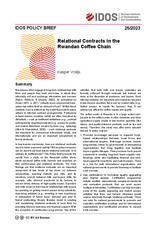Policy Brief
Relational contracts in the Rwandan coffee chain
Vrolijk, KasperPolicy Brief (25/2023)
Bonn: German Institute of Development and Sustainability (IDOS)
DOI: https://doi.org/10.23661/ipb25.2023
Businesses often engage in long-term relationships with firms and people they trust and know, in which they informally sell and exchange information and services (Baker, Gibbons, & Murphy, 2002). As postulated by Arrow (1972, p. 357), “virtually every commercial trans-action has within itself an element of trust”. Within these relations, trust is defined as the belief that market actors adhere to informal contract arrangements. Particularly in lower-income countries, which are often described by distortions – such as inefficient institutions (e.g., contract enforcement), imperfect markets (e.g., access to credit), and market distortions created by firms (e.g., lobbying) (Atkin & Khandelwal, 2020) – such relational contracts are important for commercial interactions locally and internationally and are an important complement to formal contracts. In low-income economies, how are relational contracts used to foster economic activity? What policy measures can be used to aid trust-based relational contracts, or to address its inefficiencies? This Policy Brief presents the results from a study on the Rwandan coffee chain, which surveyed coffee mills, farmers and exporters on their performance and relational contracts. The main findings are that relational contracts are an important component at two levels of the chain: (a) between cooperatives, washing stations and mills, and its members, and (b) between mills and buyers. Mills, for example, offer informal provisions to its farmers to ensure timely delivery of high-quality beans. Exporters and mills invest in trust-based relationships with buyers by spending on getting market access and productivity-increasing activities (e.g., investing in new machinery) in anticipation of future buyer demand and prior to formal contracting. Buyers likewise invest in creating and maintaining relational contracts to local firms by providing informal technical and financial support. With the exception of certification programmes, few of the activities that both mills and buyers undertake are formally enforced through contracts but instead are done at the discretion of producers and buyers. Such informal relations are important and necessary because in low-income countries there can be market risks (e.g., limited access to inputs for farmers) that, if not addressed, affect the coffee supply and quality. The coffee sector in Rwanda is to a large extent com-parable to the coffee sector in other countries and other agricultural supply chains in low-income countries (like labour- and quality-intensive products, such as tea and cocoa). Therefore, this study may offer some valuable lessons to policy makers:
1. Promote brokerage services to support trust-based relationships between local firms and international buyers. Brokerage services include programmes (either by governments of international organisations) that bring together and facilitate buyer-supplier linkages. These services have proven successful in creating long-term buyer-supplier relationships, while also facilitating financial and technical support for local firms and market access. There is a role for both international organisations and national governments to provide financing or facilitate such services.
2. Use certification to formalise quality upgrading and market access. Certification programmes include credible, internationally recognised standards and evaluation protocols that are used across multiple commodities. Certification can help formalise some of the quality upgrading and market access activities that firms and farmers otherwise would receive informally through relational contracts. There are roles for national governments to promote and subsidise certification practices and for international organisations and certification providers to expand such services.
Contact
Cornelia Hornschild
Publication Coordinator
E-mail Cornelia.Hornschild@idos-research.de
Phone +49 (0)228 94927-135
Fax +49 (0)228 94927-130
Alexandra Fante
Librarian/ Open Access Coordinator
E-Mail Alexandra.Fante@idos-research.de
Telefon +49 (0)228 94927-321
Fax +49 (0)228 94927-130




![[Translate to English:] Photo: Alexandra Fante, Bibliothekarin/Open Access-Koordinatorin](/fileadmin/_processed_/f/0/csm__c_Deutsches-Institut-fuer-Entwicklungspolitik_Fante_94ce4fa1ba.jpg)